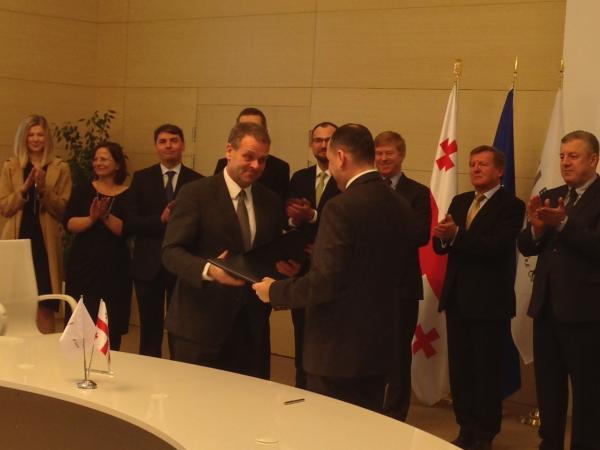
The European Investment Bank (EIB) has signed three loan agreements in Georgia: EUR 250m to finance new construction and upgrading of priority roads, EUR 100m for the rehabilitation and upgrading of municipal infrastructure and a EUR 100m intermediated loan to implement the projects of SMEs and midcap companies in the horticulture and wine sectors. The loans are covered by the European Union's comprehensive guarantee.
EIB Vice-President Jan Vapaavuori stated: “The record EIB lending provided in Georgia is of significant importance for improving the quality of life of Georgian citizens and strengthening the competitiveness of the country. Together with our European Commission partners, we will help to upgrade infrastructure in municipalities, extend the network and quality of roads important for better interconnectivity and trade opportunities of Georgia, as well as improved access to finance for companies operating in agriculture to support investments from the introduction of modern technologies from harvest to food production and marketing”.
H.E. Dimitry Kumsishvili, First Deputy Prime Minister and Minister of Finance of Georgia said: “Projects of great significance for Georgia are implemented with financial support of the European Investment Bank (EIB) in the sectors of roads, power energy and municipal infrastructure. EIB is also supporting the private sector of the country. Operation and future plans of the EIB manifest themselves in a great support to the Four Point Reform Agenda initiated by the Prime Minister of Georgia for the acceleration of infrastructure projects and support of entrepreneurship”, noted Mr, Kumsishvili and concluded: “acceleration of investments in the infrastructure sector is of a paramount importance for the development of the country. We are advancing the transport and tourism infrastructure. We hope that our investments will inspire the private sector to invest more in the country”.
The Head of the EU Delegation to Georgia, Ambassador Janos Herman, commented: “The EU is committed to helping Georgia improve conditions for resilient economic growth. There is a need to upgrade road and municipal infrastructure in many parts of the country. Agriculture has great potential for Georgia's economy. Therefore, I am confident that this major investment will give Georgian citizens and businesses tangible benefits”.
EIB funds will finance the construction and rehabilitation of priority roads identified by the government which will enhance both international connectivity – notably on the East West Highway, part of the extended Trans-European Transport Network – and domestic mobility. This will contribute to strengthening the vital links between Georgia, Ukraine and Europe through the Black Sea ports, and also to Armenia, Azerbaijan and Turkey. This project is highly relevant in the context of the EU-Georgia Association Agreement, which includes a Deep and Comprehensive Free Trade Area Agreement, helping develop more efficient, reliable and safe transport connections for the benefit of Georgian citizens.
The loan addressing the rehabilitation and upgrading of Georgia’s municipal infrastructure over the whole country, including water and waste water infrastructure, municipal roads and public buildings, will help to improve the everyday living conditions of Georgian citizens. Through an increase in energy efficiency and reduction of water losses, improved safety on local road networks and better wastewater management, this programme will result in higher quality and safety for public services in several Georgian cities. These investments will also contribute positively to environmental protection and to the improvement of public health in Georgia.
The loan for the benefit of companies in the horticulture and wine sector will make long term finance with favourable conditions available to small and medium-sized enterprises in the agri-food value chains. It aims to increase the productivity and competitiveness of Georgian companies through the introduction of modern, resource-efficient technologies ranging from primary production to processing, marketing and distribution.
The funding will result in the improvement of orchard nursery capacity and plant and produce testing facilities, the replacement of old and unproductive orchards and vineyards, the introduction of improved irrigation technologies, and investments in post-harvest handling, packaging and cold-storage infrastructure. The implementation of the loan will be supported through Technical Assistance activities funded by the Neighbourhood Investment Facility of the European Union and by the Eastern Partnership Technical Assistance Trust Fund.

Photographer: EIB ©EIB
Download original

Photographer: EIB ©EIB
Download original

Photographer: EIB ©EIB
Download original

Photographer: EIB ©EIB
Download original